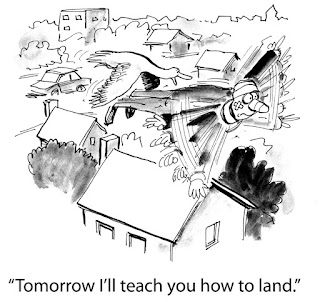Uh-oh. Clearly this teacher and novice flier and had no real plan for success. Landing smoothly and safely should have been a high priority goal of this new skill of flying.
Thanks to experts in the transfer of training to the workplace, there is helpful advice on how to learn new skills fast and set yourself up to succeed with no crash landings. Follow this step-by-step plan:
- Clearly define your goal. Let’s say you’d like to learn to play the piano because you have always wanted to make your own music and entertain friends. Your goal should be specific and time-bound. How about committing to mastering 3 songs in 3 months…just in time to invite friends for the holidays. As one mountain climber friend jokes, “my goal is to summit Everest and make it back down alive, not just to reach the top.”
- Identify individual components of the skill. For piano, it might be learning to read music, relating sheet music to the actual piano keys, strengthening your fingers, playing with 2 hands, and so on. For climbing Everest it may be components of rock climbing, abseiling, scrambling, glacier travel, camp craft, altitude adjustment, first aid and physical fitness.
- Anticipate pitfalls. Think about why you might lose motivation so you’re prepared for any challenges ahead. Possible solutions? Hire a teacher (or Sherpa) who can inspire you when you falter or go to a piano concert to reinforce your goal.
- Choose the most critical components and work on one at a time. For piano, play with the right hand first to hear the melody. Once you get that down, you can add the left hand with simple chords. For Everest, many climbers start by gaining a certain fitness level and then progress to basic rock climbing, more advanced rock climbing, ice climbing, altitude climbing and solo climbing.

